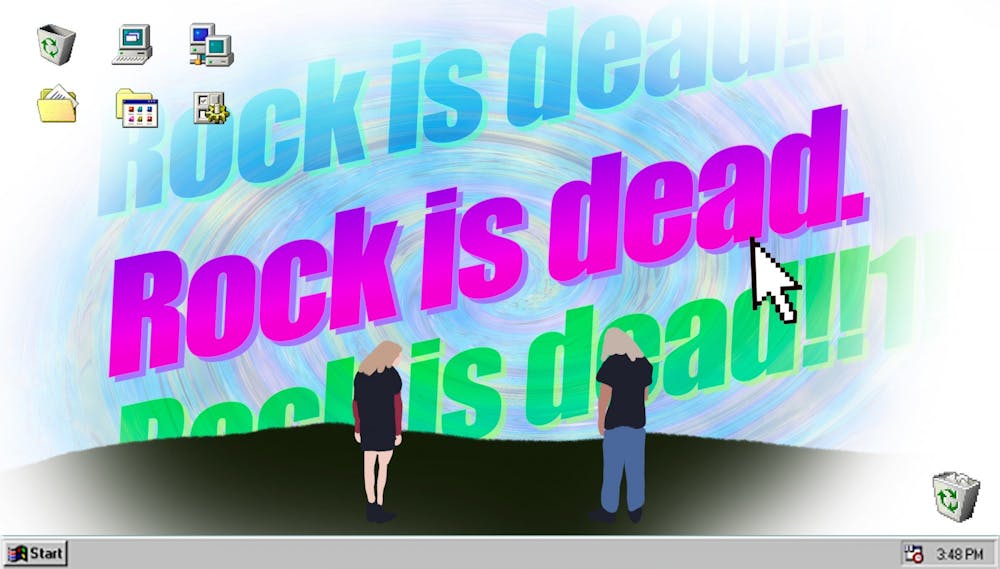Punk rock died. I accepted it and moved on, adapting to a new music scene just as radical and anarchist: hyperpop.
This musical genre has created quite a stir within the last five years, mostly due to its inherent queerness and experimental sound. However, this isn’t the only parallel to punk rock as the two genres share more than meets the eye.
First, both punk rock and hyperpop exploded exactly 40 years apart: 1977 and 2017.
1977 marked the first release from mastermind Malcolm McLaren’s Sex Pistols. Their single “God Save the Queen” rose to number two on the U.K. charts, eventually being censored for having vulgar lyrics. Despite being a fashion band, they created a space for controversial music, allowing a generation of artists to express their anger through music.
2017 was a prolific year for the most important person in the hyperpop scene, late producer and pop star SOPHIE, who released three singles off her album “OIL OF EVERY PEARL’S UN-INSIDES.” She also produced songs for Charli XCX, Vince Staples and Banoffee this year, solidifying her name as a pop producer.
[Related: Punk rock has lost all meaning]
Both scenes exploded in the United Kingdom, with the Sex Pistols in England and SOPHIE in Scotland. They were both criticized for being controversial, punk rock for using visual shock tactics and hyperpop for being auditorily shocking. Finally, these scenes suffered tragic losses early in their conception, with Sex Pistol bassist Sid Vicious’ overdose and SOPHIE’s accidental death.
So, what exactly is hyperpop? I consider it to be an anti-pop movement that champions authenticity and experimentation. Other than SOPHIE, prominent artists include Charli XCX, 100 gecs, Slayyyter, Kim Petras, Arca and food house. Most of these performers fall under the transgender umbrella, making the scene outspokenly queer and almost exclusively for queer people. Out of this list of artists I provided, six of them are openly transgender/nonbinary or include openly trans members.
This scene cannot be divided from the transness and queerness that created it. For example, 100 gecs’ Laura Less heavily autotunes her voice to help fix her vocal dysphoria, a practice that has quickly become a standard within the genre. Other genre standards include intentional glitches, nonsensical synth, and screaming accompanied by heavy electronic guitar, a motif that cannot be escaped.
[Related: Swing in September concert series to begin Sept. 2 in Dunn Meadow]
So, how is this punk? There are too many uncanny parallels to mention, but there are a few that stand out.
Both genres are anti-pop. Punk rock was first and foremost a counterculture movement, as seen in “God Save the Queen” by the Sex Pistols and “Police Story” by Black Flag. Punk rock was against establishment, against tradition, and against popular culture. Hyperpop is exactly the same. Songs like “mos thoser” by food house and “Faceshopping” by SOPHIE demonstrate its anti-tradition roots.
Punk rock and hyperpop also share deep connections to queerness. Due to its counterculture roots, queer people flocked to the punk rock scene, creating bands like Pansy Division, the Germs, and Bikini Kill. These bands created progress for the LGBTQ community, showing off successful and vengeful rockers screaming for equality. I’ve already touched on this, but hyperpop is intrinsically queer, started by a trans woman (SOPHIE) and carried on by other trans women like Laura Les, Kim Petras, among others.
Finally, these two musical movements define themselves as anarchist. Well, more progressive. Punk rock was inherently anarchist, since it was the only political ideology at the time that encapsulated enough of the anti-establishment values at punk rock’s core. Due to its inherently queer nature, hyperpop is inherently progressive. From Laura Les’ Twitter, we can see major bands are anti-fascist within the hyperpop community.
The world of hyperpop expanded during the COVID-19 pandemic, allowing artists cooped up with a computer to try whatever sounded interesting to them and share it with an overwhelmingly accepting community. Just like Black Flag said, “try to stop us / it’s no use!”
Charlotte Jones (they/her) is a sophomore studying English and journalism.




